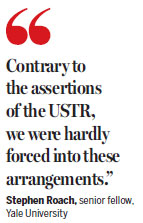With US Treasury Secretary Steven Mnuchin about to lead a delegation to China in the coming days to ease bilateral trade tensions, American experts have challenged their government's accusations against China.
The Trump administration threatened tariffs on $150 billion worth of imports from China following a Section 301 of the US Trade Act of 1974 investigation into China's intellectual property policies and practices.
In a 182-page Section 301 report issued on March 22, the US trade representative accused China of unfair trading practices regarding technology transfer, intellectual property and innovation.
Stephen Roach, former chairman and chief economist of Morgan Stanley Asia and now a senior fellow at the Yale University Jackson Institute of Global Affairs, said the US has a weak case against China and called the US report "wide of the mark in several key areas".
On the forced technology transfer in joint ventures in China, Roach argued that the US and other multinational corporations willingly enter into these legally negotiated arrangements for commercially sound reasons - not only to establish a toehold in China's rapidly growing domestic markets, but also as a means of improving operating efficiency with a lower-cost offshore Chinese platform.
He said portraying US companies as innocent victims of Chinese pressure is certainly at odds with his own experience as an active participant in Morgan Stanley's joint venture with the China Construction Bank to establish China International Capital Corp in 1995.
"Contrary to the assertions of the USTR, we were hardly forced into these arrangements," he wrote on the Project Syndicate website on Tuesday.
Roach also criticized the portrayal of China's outward investment as a unique state-directed plan aimed at gobbling up newly emerging US companies and their proprietary technologies. That includes the description of the Made in China 2025 strategy as a plot to dominate future industries in the world.

"The USTR is entirely correct in underscoring the role that innovation plays in shaping any country's future. But to claim that China alone relies on industrial policy as a means toward this end is the height of hypocrisy," Roach said, citing many examples of industrial policies in Japan, Germany and the US.
He listed NASA-related spinoffs, the internet, GPS, breakthroughs in semiconductors, nuclear power, imaging technology and pharmaceutical innovations as "important and highly visible manifestations of industrial policy the American way".
On the accusation of cyber-espionage, Roach noted that the cases cited in the Section 301 report were mostly before China and the US reached an agreement in September 2015 on cybersecurity, and such cases have since declined dramatically.
He called the USTR report "a biased political document that has further inflamed anti-China sentiment in the US".
"But the case made by the USTR is an embarrassing ymptom of a scapegoat mentality that has turned America into a nation of whiners," Roach wrote.
Nicholas Lardy, a senior fellow at the Peterson Institute for International Economics and an expert on the Chinese economy, argued that China's protection of intellectual property is improving rather than worsening.
China's payments of licensing fees and royalties for the use of foreign technology have soared in recent years, reaching almost $30 billion last year, nearly a fourfold increase over the last decade, Lardy wrote on the Peterson Institute website last Friday.
According to Lardy, China ranks fourth globally in the mount it pays to acquire foreign technology, well behind Ireland, the Netherlands and the US, but ahead of Japan, Singapore, South Korea and India.
Because licensing fees in Ireland and the Netherlands are paid mostly by foreign holding companies that are legally domiciled in those countries for tax reasons, and the subsidiaries of these holding companies using the licensed foreign technology are located in other jurisdictions worldwide, Lardy argued that China probably ranks second globally in the magnitude of licensing fees paid for technology used within national borders.
The US and Chinese governments have disagreed on many narratives about the trade and investment issues between the two countries.
Douglas Paal, vice-president for studies at the Carnegie Endowment for International Peace, said that it's still too early to predict the outcome of Mnuchin's trip.
"This could be the beginning of a deal or the beginning of a trade war. It's too early to say, given Trump's style," Paal said.
chenweihua@chinadailyusa.com
(China Daily USA 04/26/2018 page2)
